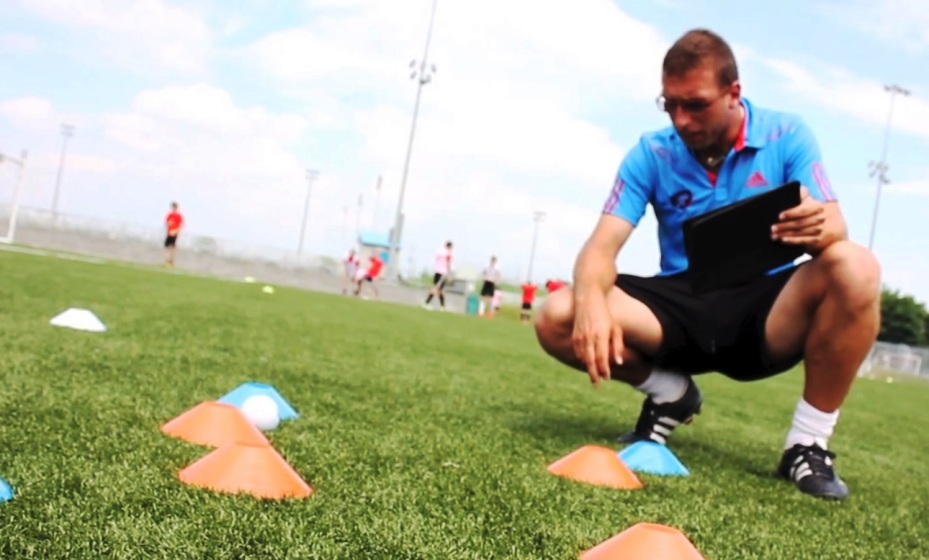

A useful tool for coaching Soccer: abstract thinking
Have you ever had this conversation with a football-crazy person? Spark was on, and the excitement at its peak. He/She’d use his fingers and shake his hands hectically but nothing looked as clear as a YouTube video. In brief, you’d hook to the conversation for the passion but you could barely picture anything of what the person said.
Football Ideas you can talk of are as complex and abstract as the play can get. Coaches will always be keen to put words on it, as long as the image is in their mind. And that’s when things get exciting, because the conversation itself reflects how the play and more football stuff is built, on long term. And that is through abstract thinking. Here are examples of how coaches develop the thinking that will help them guide players, and hopefully share their passion with more people.
I was 16 when I began setting up exercises for young players. At first, it was a matter of copying what my own coaches would make my team do. Exercises for our future players were mainly focussing on isolated actions, so that we could get them succeed, and “paste” these actions together in the play. Later on, I was doing a coaching license course in my home province, where the idea of teaching was based on an action, such as a combination between two players or a deceptive displacement. This was what coaches had to show and tell players. Thing is: actions are responses to a situation, not something you tell a player to do… because you can’t control the play nor you can’t determine what the player will experiment.
In such conditions, the best coaches can do is to create starting circumstances and guide a few decisions so that probabilities turn in favour of the players to succeed, whatever action they choose to do. For instance, a coach will figure out the space, the amount of players, or even the starting position of each players so that specific opposition situations can occur. Anybody watching the play from outside should make links between the chosen circumstances, and the actual response from the players. It will get abstract, and it’s the right way.
Throughout the past years, I went to study in Brazil, where I covered how players make decisions in the play, and what it looks like even when they don’t have the possession of the ball. The good thing with literature is that everything a player would do could be translated in detailed principles. Think of Neo seeing the world in code in the Matrix. On the other hand, there would be none of this visual without the play in front of you and it gets very abstract to picture it mentally if you have not seen it repeatedly.
This abstractness is what coaches need, starting with the imagination of the play. Focussing on the interaction between a few players leads to see movements globally, just like tendencies. You can even understand tendencies by comparing them to analogies. Picture a lung breathing to refer how your team will expand when they have possession, and tighten when it doesn’t have the ball. Start with reading the play and describing what you see in its globality to help articulate your abstract thinking.
Progressively, you’ll start managing ideas of the game like building blocks. Being the coach who drives the team is a matter of reading the play through these ideas. When you’ll report ideas that go well, you’ll tool up your players. When you’ll figure out how to set up these ideas, you’ll help the team earn confidence in doing things better and revealing who it is, collectively.
Ironically, the more you’ll switch from “reading the play through ideas” to “putting them in words”, the more you’ll be able to take part in abstract conversations, pull actual pictures out of it, and take advantage. It will then be more exciting to integrate them in your daily work.
Finally, you can think of case studies as the top objective to reach. Harvard, MIT and big schools have this reputation to work with case studies as they are educating the next generations of decision-makers. Not only their students are able of identify game changers in each of the cases, but they also do it with a massive span of considerations. It reflects the abstract, global thinking, useful to us when cracking down problems in the play. It is also useful balancing priorities such as the importance of a player doing something specific, something the coach wants, or rather let him experiment situations for his own development.
This very thinking turns into a habit if you apply it on a daily basis. It makes you direct your efforts better. It makes you build a deeper understanding of what lays behind what you see. And when you act accordingly, it makes you reach the extra 10% better result.
Abstract thinking has been a useful tool for my ascension and progression as a coach. It feeds a lot of decisions. Although, I also leave a few interlocutors in the fog. That happens. The flip side of it – the challenge – is to keep in mind examples and solutions we can use to illustrate that thinking with. Who does this can get as good as speaking like TED Talks lecturer than coaching. And he’d have it all.
The cherry on the cake is when you get to use this thinking – and your ability to share it expressively – as you think forward. At the end of the day, you can create a lot with all of this because, as a great man said, “Imagination is more important than knowledge.”
Learn how to use variability to improve the creative thinking in our course “Differential Learning System – Soccer”
Follow us on Facebook!
Categories
Latest Courses
-
9 Lessons
-
1 Lesson
-
6 Lessons
You May Also Like
-
-
August 1, 2022
-
-
June 3, 2022
-
-
May 27, 2022





